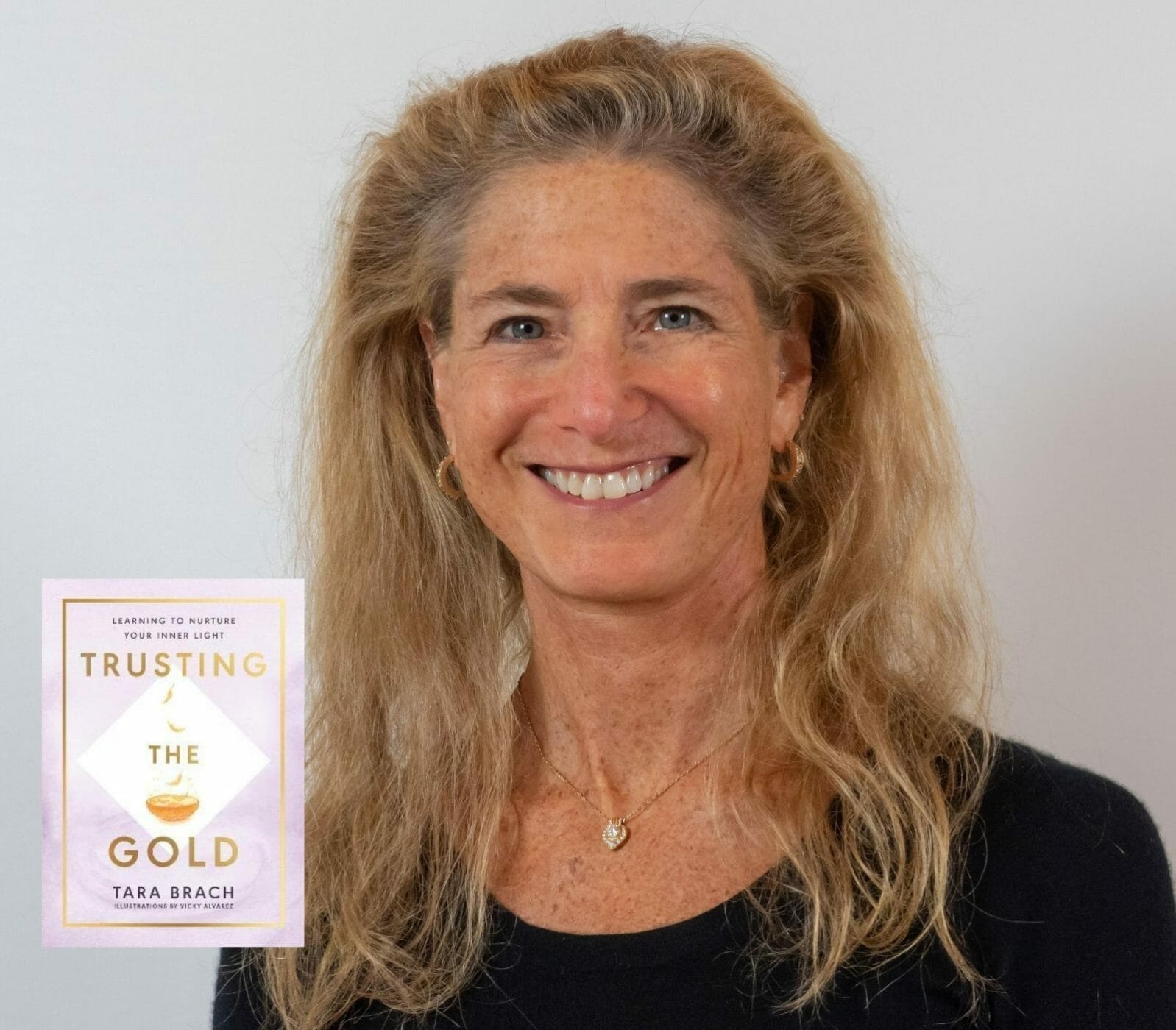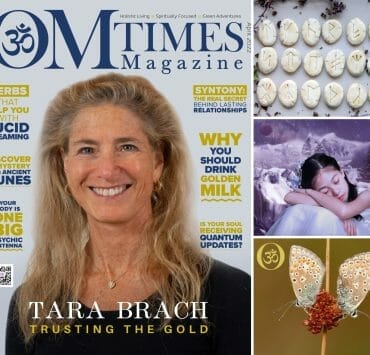Tara Brach: Trusting the Gold

Tara Brach is an American psychologist, a proponent of Buddhist meditation, and an international bestselling author.
An Interview with Tara Brach: Trusting the Gold
To listen to the full interview of Tara Brach by Victor Fuhrman on Destination Unlimited on OMTimes Radio, click the player below.
Tara Brach’s teachings blend Western psychology and Eastern spiritual practices, mindful attention to our inner life, and a full, compassionate engagement with our world. The result is a distinctive voice in Western Buddhism, one that offers a wise and caring approach to freeing ourselves and society from suffering.
In 1998, Tara founded the Insight Meditation Community of Washington, DC (IMCW), which is now one of the largest and most dynamic non-residential meditation centers in the United States. She gives presentations, teaches classes, offers workshops, and leads silent meditation retreats at IMCW and at conferences and retreat centers in the United States and Europe.
Victor Fuhrman: Tara, thank you for being here with us. For our readers meeting you for the first time, please share your path and how it led to your calling and practice.
Tara Brach: I grew up, and my great love was nature, which was my spirituality, but I was also very keenly interested in social transformation. So, I was on track to becoming a lawyer, and I took a radical left turn. Instead of going to law school, I went to an ashram and spent ten years. But what brought that on was that I was in college, and we’d go to demonstrations, and there’d be a real fervor of calling the other the enemy and raising the fist. Then on Tuesday nights, yoga class, where there’d be that quietness and connection. I remember one spring night walking out after yoga class and stopping by a fruit tree and realizing that my body and my mind were in the same place at the same moment.
And, and there’s such peace and tenderness are universal belonging. I realized; this is what I needed. This is what I cherish. This is what the world needs. Without a shift in consciousness, there will not be the kind of authentic societal transformation I was working for.
So, that’s what brought me into the Ashram. And I practiced for ten years, a lot of yoga and meditation, and then shifted from Ashram living to Buddhist retreats. I found that the mindfulness teachings and the compassion teachings and Buddhism really resonated, and ever since these last many decades now, that was in my twenties. I’m now in my late sixties. I have been teaching Buddhist meditation. I’ve been instructing teachers to teach Buddhist meditation training mentors to mentor people in meditation. So, this has been my world.
Victor Fuhrman: How did you come to blend psychology with Eastern spiritual practices?
Tara Brach: The draw to psychology deep down was the same draw to moving into the Ashram, which is understanding what causes suffering and what heals suffering.
Western Psychology has domains that are incredibly useful in understanding how our path has been created.
We’re experiencing and having the therapist’s role in holding space and making, creating a safe container for the unfolding, and bringing what’s outside of consciousness into consciousness. And similarly, in meditation, we’re shining the light of awareness on what’s here and inviting into awareness the parts of our being that we pushed away. So, we’re unfolding into more and more of a wholeness of being. So, the two paths I found very complimentary. So, while I was in the Ashram, I started my doctorate and finished it afterward. So, I could weave being a Western psychologist with being a Buddhist meditation teacher.
Victor Fuhrman: Your doctoral explored meditation as a therapeutic modality in treating addictions. How does the healing community receive this?
Tara Brach: Well, my dissertation was approved. I got my doctorate. It was one of the very early studies on the impact of meditation on addictive behavior. And what I found was that meditation was as powerful as the leading psychological modality, which was cognitive behavioral therapy, which still holds, is a front runner. And that further to be a long-term change. And this feels important, Victor because it needed to be practiced in a relational context. In other words, we’re relational beings, and we need the support of each other to make deep changes. It is the same thing with working with addiction. We need to hold hands when we’re working through suffering.
Victor Fuhrman: Absolutely, you practice and teach Vipassana or insight meditation. Please tell us about this practice.
Tara Brach: Vipassana is from the Buddhist tradition, one of the early Buddhist teachings. Mindfulness means to see, to feel full, to listen deeply. In other words, it has to do with having an intimate, direct real experience of reality. I think of it most simply as we are recognizing and relaxing back into the reality that’s there and that in daily life, we often go through this, we’re in a trance, we’re in some way fighting what’s here, we’re trying to feel better. So, we either resist our experience, or we’re grasping after things. And Vipassana and I include that the heart practices of compassion help see what’s happening. It’s like we become a witness to that. To include the experiences that are going on in a larger space of being. It’s like realizing the waves here and becoming the ocean that includes all the waves.
And there’s an understanding that if you realize you’re in the ocean, you’re not going to be afraid of the waves, but the suffering that most of us experience is we get, identify with a cluster of waves. We think, okay, this is me, this tendency towards addiction, defensiveness, tendency to eat too much, being overweight, or not get close to other people. And we take a cluster of waves and say, okay, this is me. And I don’t like this self. And I would say that the most profound suffering I have encountered is what I call the trance of unworthiness, which is a sense that we’re, there’s some fundamental flaw.
And that’s the suffering of the trance of unworthiness that if we’re turned against ourselves, whether it’s because we think we’re a bad parent or we think we’re a bad partner or bad friend, or we think that we’re not contributing or whatever it, in those moments of judgment. Self-judgment, we’re not open to our world. We can’t see the beauty of the sunset or the gleam in a child’s eyes, the moment’s magic. So many people start realizing, “wow, I’m spending a lot of my moments at war with myself” just even recognizing that we’re in the trance of unworthiness can energize us to say, wait a minute.
Honestly, I would say it took probably a decade to discover the kind of practices, what I now call radical Acceptance and Radical Compassion, where we embrace ourselves fully with kindness. And in that way, we’re able to open our hearts to others in a much deeper way.
Victor Fuhrman: As a child, growing up in my early teens, I had this wiring that only my worth was measured in what I could do for others. When I was 17, moody blues came out with an album called the question of balance, and there was a line in the song questioned by Justin Hayward, where he says: when you stop and think about it, you won’t believe it’s true, that all the love you’ve been giving has all been meant for you. When I heard that, I played that back-to-back continuously, and it released me.
Tara Brach: Wow, that’s a beautiful story, Victor, because if you can take in the truth of our intrinsic worth, I call it trusting the gold. That’s the name of my most recent book. So, if we can trust the gold in ourselves, our basic essence of nature is an awareness and love and creativity that is beautiful.
Then we see the gold in each other, and I’ll share a story that touched me with you. Years ago, I heard a true story about this huge Southeast Asia that wasn’t very attractive. It was just massive plaster, kind of statue. It was very popular over the centuries, and then it survived different governments and wars, but in the fifties, when we were three-four years old, there was a drought, and it cracked open some.
And when monks looked in to see what its infrastructure looked like, what gleam back was the shine of gold. So they started taking apart what turned out just to be the plaster clay coverings and found it was the largest solid gold statue of the Buddha in all Southeast Asia. So, they finally discovered what historians have confirmed, that during the time of war and conflict, the monks in that monastery had covered the statute to protect it from being destroyed or stolen.
What’s profound about this is that we cover over our essential nature, our gold to get through difficult times, a challenging society, and often difficulty in our families. We cover over our innocence and our purity, and there are defenses, and there’s aggression. So the spiritual path is rediscovering our essential nature, that basic goodness, that gold, and knowing that the coverings are there. They’re natural. They’re part of what happens developmentally, but they don’t have to define us.
Victor Fuhrman: So how may one begin the practice of insight meditation or Vipassana?
Tara Brach: I always encourage people to start simply. Putting aside some time every day makes a difference because nature loves rhythms. Like we, if we have a habit of practicing coming into stillness and deepening our attention on purpose once a day, let’s say, become kind of a gravitational field, and it draws us more and more into presence through the day. It bleeds into the day. So to find a time that’s a protected time where you’re not going to have children barging in or just a somewhat protected space. Even if this is for 10 minutes, it’s fine. 10, 15 minutes. Even if it’s five minutes, whatever you can take comes into the stillness. Generally, people sit still, but you can lie still or standstill.
Its posture isn’t as important as that. You’re, on purpose, going to be paying attention to what’s going on inside you. And two questions are helpful just to get yourself there. And one is what is happening inside me right now.
And can I be with this, or can I let this be? And as a way to kind of bring yourself and arrive in that stillness, you can often begin with the breath and let the primary focus beyond the breath and just ask, well, what’s the breath feel like right now? So, you can be with that breath and just allow the inflow and the outflow to help relax you and gather your attention. As you learn Vipassana, you will gradually become familiar with allowing all the different experiences to arise, whether it’s feelings of sorrow or fear.
Like a passing river, you just notice what’s passing through. And, of course, part of what’s passing through our thoughts. So, you let the thoughts be like clouds that pass through you. You notice them when you become aware of them because we all will get lost in them, and then you just say: oh, okay. Thinking, thinking, and then relaxing, open again and see what’s next. So, in that way, the practice is gathering your attention with the breath and then opening to whatever moves through you—moment by moment. And the bottom-line invitation is not to judge, just not to judge. Think of it as you’re befriending your experience, becoming friends with your experience, and bringing interest just a curiosity. What’s reality like in this moment.
Victor Fuhrman: What compassionate advice would you share with those who say they can’t meditate?
Tara Brach: Well, many of us think we can’t meditate because our minds are busy and there’s a lot of restlessness and a lot of distraction, but actually, what we find out if we compare notes is that the way the mind is? So, what I would say is good-humored about it. It’s like, you’re thinking of it. Like you’re training a puppy, and initially, a puppy will do everything. They’ll go over to a corner of the room and pee, and they’ll do the whole thing, and you’re not going to punish the puppy. You’re not going to, you know, you’re not going to get angry and in some way be mean, what you’re going to do instead is just patient, be consistent and keep on with, with friendliness and humor, just invite the puppy back, say, oh, hey, come back, come back, stay sit.
Victor Fuhrman: Let’s talk about your first book, Radical Acceptance, embracing your life with the heart of a Buddha. What are some of the ways we may embody Radical Acceptance? And why is it radical?
Tara Brach: If you think of what regular acceptances are, we’re accepting. I accept this is the meal that I’m having, and they didn’t have my first-choice order at the restaurant, or I’m accepting that you’re speaking in that tone or something like that. But radical acceptance has to do with recognizing and opening to what’s happening in the present moment, inside you. So, radical Acceptance means that I’m open to the feeling of not liking the tone. You’re speaking in the aversion. It might include feeling the disappointment in my body. So, it’s an honest, awake connection with what’s going on inside us. And what it allows us to do is come back into reality.
Continue to Page 2 of the Interview with Tara Brach
Click HERE to Connect with your Daily Horoscope on OMTimes!
Visit Our Astrology Store for Personalized Reports
OMTimes is the first and only Spiritually Conscious Magazine. Follow Us On Facebook, Twitter, Instagram, Linkedin, Pinterest, and Youtube
Rev. Victor Fuhrman, MSC, is a healer, spiritual counselor, and author whose deep, rich, compassionate and articulate sound inspired the radio handle, “Victor the Voice”. A former armed forces broadcast journalist, Victor Fuhrman is a storyteller by nature and an inspiring public speaker. He brings unconditional love, compassion and a great sense of humor to his ministry. Victor is the Host of Destination Unlimited on OMTimes Radio, Wednesdays at 8:00 PM ET. http://omtimes.com/iom/shows/destination-unlimited/







